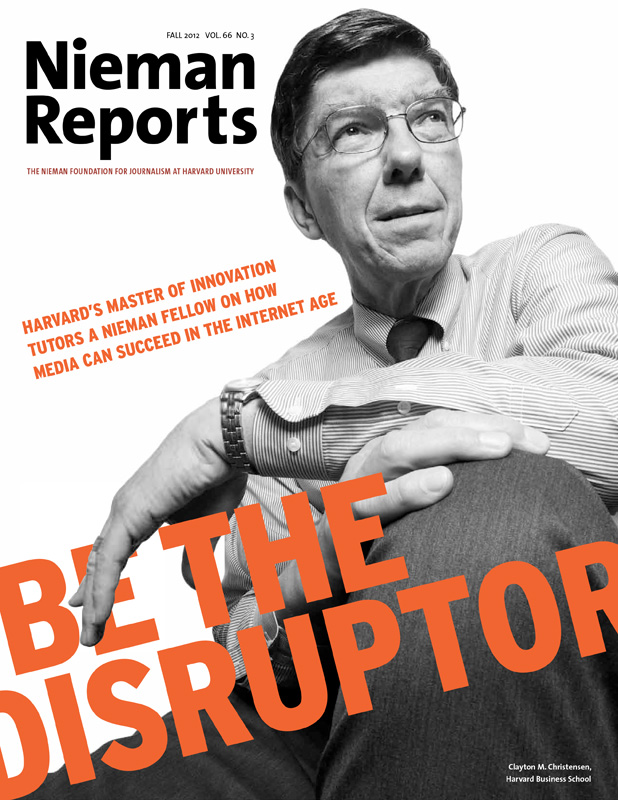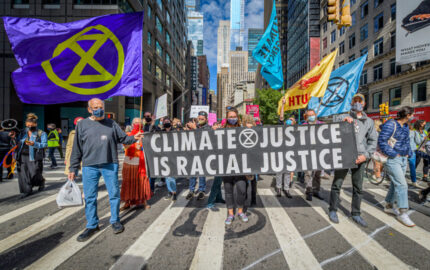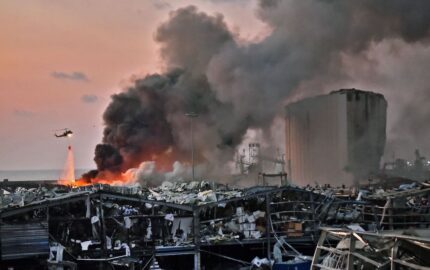
Be the Disruptor
Harvard Business School professor Clayton M. Christensen’s theory of disruptive innovation provides a framework to understand how businesses grow, become successful, and falter as nimble start-ups muscle in on their customers. It’s a familiar story, one that has played out in the steel and auto industries, among others. Now Christensen, in collaboration with 2012 Nieman Fellow David Skok, has applied his analysis to the news industry. Their goal in this issue's cover story, “Breaking News,” is to encourage news executives to apply the lessons of disruption to the media industry as a means of charting new paths to survival and success.
| Beginning with this issue, Nieman Reports is now the home for Nieman Watchdog Project articles examining the successes and failures of watchdog journalism. Here, Dan Froomkin probes the challenges facing national security reporters at a time when the nature of combat is quietly undergoing a revolution. |
It's a particularly challenging time for American national security reporting, with the press and public increasingly in the dark about important defense, intelligence and counterterrorism issues.
The post-post-9/11 period finds the U.S. aggressively experimenting with two new highly disruptive forms of combat—drone strikes and cyberattacks—for which our leaders appear to be making up the rules, in secret, as they go along.
Troubling legal and moral issues left behind by the previous administration remain unresolved. Far from reversing the Bush-Cheney executive power grab, President Barack Obama is taking it to new extremes by unilaterally approving indefinite detention of foreign prisoners and covert targeted killings of terror suspects, even when they are American citizens.
There is little to none of the judicial and legislative oversight Obama had promised, so the executive branch's most controversial methods of violence and control remain solely in the hands of the president—possibly about to be passed along to a leader with less restraint.
More than a decade after it started, we still have no clue how much the government is listening in on us or reading our e-mail, despite the obvious Fourth Amendment issues.
And the government's response to this unprecedented secrecy is a war on leaks.
No Help From High Places
After past periods of executive excess, the Fourth Estate was certainly more robust and arguably more persistent, but it also found natural allies in the other branches of government—particularly Congress. By contrast, over the summer of 2012, the publication of a minimal amount of new information regarding drones, cyberwarfare and targeted killings incited bipartisan agreement on Capitol Hill—not to conduct hearings into what had been revealed, but to demand criminal investigations into the leaking.
That's how Congress has been ever since the terrorist attacks 11 years ago. "We never got our post 9/11 Church Committee," said Steven Aftergood, director of the Federation of American Scientists's Project on Government Secrecy, referring to a special investigative Senate committee that held hearings on widespread intelligence abuses after the Watergate scandal. "What we've got instead is the intelligence oversight committee drafting legislation to penalize leaks."
In the interim, the White House has been plenty busy using the draconian Espionage Act of 1917 to pursue leakers. Despite his talk about openness, Obama has taken the unprecedented step of filing espionage charges against six officials accused of leaking information to journalists—more than all previous administrations combined.
And James R. Clapper, Jr., the director of national intelligence, recently directed that employees under his command be hooked up to lie detectors and questioned about their contacts with journalists and about unauthorized leaks to the media.
Whatever restraint existed inside the executive branch seems to have been overwhelmed by a national security apparatus that has swollen to enormous proportions since 9/11. "There has been no similar strengthening of bureaucracy protecting civil liberties and transparency," noted New Yorker writer Jane Mayer. "When the national security community is militating for leak investigations, there is much less pushback than pre-9/11."
Abramson's Concern
Mainstream media leaders are critical of the government's aggressive posture, which they see as threatening First Amendment rights. At the annual conference of Investigative Reporters and Editors in June, New York Times executive editor Jill Abramson made the case that the very leaks that seemed to inflame officials the most were also the most essential.
"Cyberwarfare is a new battlefield, where there are no agreements regulating the use of malware viruses," she said. "So doesn't the public need the information to evaluate this new kind of battle, especially when it's waged in its name? Furthermore, when the existence of drone and cyber attacks are widely known but officially classified, informed public discussion of critical questions is really stifled."
There are in fact so many obvious, unanswered questions about both of these new weapons of warfare, most notably: What happens when other people use them on us, saying we set the precedent for their use? In the case of drones, does their use require a declaration of war or at least an authorization of the use of force? And how many civilians are they killing?
Abramson warned that "the chilling effect of leak prosecutions threatens to rob the public of vital information," as sources fear legal retribution and reporters fear being subpoenaed and possibly even prosecuted themselves.
"Several reporters who have covered national security in Washington for decades tell me that the environment has never been tougher or information harder to dislodge," Abramson said. "One Times reporter told me the environment in Washington has never been more hostile to reporting."

The Drake Effect
One of the Obama administration's early attempts to prosecute whistleblowers for espionage ended in defeat and disgrace. Prosecutors had filed 10 felony charges against Thomas Drake, a National Security Agency (NSA) whistleblower who allegedly provided classified information about mismanagement at the NSA to a Baltimore Sun reporter. But days before the trial was to start, the government dropped the charges and settled for Drake pleading guilty to a misdemeanor. The judge called Drake's four-year persecution by the government "unconscionable" and said that it goes against "the very root of what this country was founded on against general warrants of the British."
But Aftergood said the Drake case had a profound effect on the intelligence community nonetheless. "I think there's a new level of paranoia within government about unauthorized contacts with the press," he said. "In every significant sense, the government won, because it demonstrated the price of nonconformity."
Drake agreed. "It was very clear that they wanted to send the most chilling of messages, and that chilling message has been received," he said. Among former colleagues, Drake said, "there are those who will not talk to reporters—and we're not even talking leaking, we're just talking talking."
Ron Suskind, one of a handful of journalists who did exceptional national security reporting during the Bush era—particularly in his 2006 book "The One Percent Doctrine: Deep Inside America's Pursuit of Its Enemies Since 9/11"—argues that the government's strategies to prevent leaking have suddenly become much more aggressive and effective. "It's making it more difficult to get that information the public truly needs to know," he said.
The increased dependence on e-mail and the government's enhanced surveillance abilities are also a factor, Suskind said. "In the old days, you could call someone up on their kitchen phone. You were pretty much OK unless [FBI director J. Edgar] Hoover knew which line to tap. Now you have to be extra careful."
And Suskind said that the fear of getting caught is now heightened because so many intelligence officials are counting on entering the hugely lucrative world of intelligence contracting once they leave public service.
Before 9/11, the private intelligence/national security complex just "didn't have that kind of money," Suskind said. But now, it provides "the soft cushion that awaits almost every official inside government with a security clearance."
The Government View
Justice Department spokesman Dean Boyd rejected the media narrative of a government assault on the press. "The media obviously is an interested party—or a biased party—in these matters," he said.
"Whenever the Justice Department conducts an investigation relating to leaks of classified information to the media, it seeks to strike the proper balance between the important function of the press and law enforcement and national security imperatives," Boyd said.
But, he insisted: "When classified information is improperly disclosed to the media by a person who has no authority to disclose it, that's illegal."
Boyd also denied that whistleblowers are being targeted. "On some of the cases, it's clear that the officials that we've accused are not blowing the whistle on anything," he said.
The six people the Obama administration has charged under the Espionage Act are Drake, who was definitely a whistleblower; Bradley Manning, the U.S. Army private accused of leaking thousands of documents to the website Wikileaks; John Kiriakou, a former CIA officer who spoke out about torture and is charged with allegedly disclosing the names of CIA officers and their role in interrogations to reporters; Jeffrey Sterling, a former CIA officer charged with leaking information about a botched plot against the Iranian government to The New York Times; Stephen Kim, a former U.S. State Department foreign policy analyst charged with disclosing information about North Korea's nuclear program to a Fox News reporter; and Shamai Leibowitz, a former FBI linguist convicted in May 2010 of disclosing wiretaps of the Israeli Embassy in Washington to a blogger.
Fighting Secrecy
What's as dangerous as the dearth of "unauthorized" leaks is the prevalence of the "authorized" kind. During the Bush years in particular, highly selective leaks from the vice president's office regularly spread consequential and misleading national security information, through the conduit of devoted reporters.
After vice presidential aide I. Lewis "Scooter" Libby was found guilty of perjury and obstruction of justice related to the leak of Valerie Plame's identity as a covert CIA operative, Mark Feldstein, a journalism professor at George Washington University, told the New York Times that the journalists involved were "not fearless advocates … but supplicants, willing and even eager to be manipulated."
Suskind said he thinks there need to be more reporters on the national security beat. "We are having trouble mustering the muscle, the bodies, to get the goods," he said.
And they need to be tougher. Walter Pincus, the veteran national security reporter at The Washington Post, said modern news organizations are so eager to be seen as evenhanded that crusading journalism is frowned upon. "The industry has been mau-maued," Pincus concluded. "We've been neutered."
In the Spring 2008 issue of Nieman Reports, investigative reporter Ted Gup suggested that news organizations dedicate a beat to secrecy. Now, in order to create a cycle of repeated disclosures and sustained public interest in drones and cyberwarfare, perhaps reporters should be put on that beat full time.
Suskind said there would be a payoff from major national security revelations beyond the obvious public service. "The big disclosures still drive the global news cycle," he said. And if news organizations are trying to differentiate themselves in the new media climate, well, "this is the way they get to prove their case that they're still valuable … that they're indispensable."
Dan Froomkin, who previously was deputy editor for NiemanWatchdog.org, writes about watchdog journalism for Nieman Reports. He is senior Washington correspondent for The Huffington Post.


